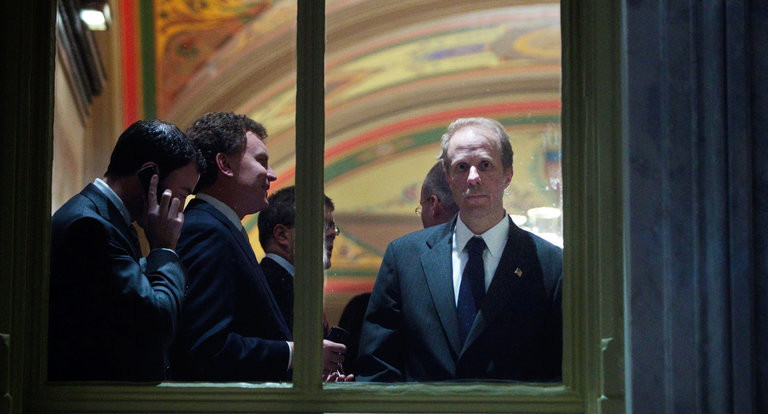Trump looks to curb intelligence agencies with “review” headed by New York billionaire
Developments on Day 27 of the Trump Administration:
Trump’s “Review” of Intelligence Agencies
Under pressure over revelations of his Administration’s links with Russia, Donald Trump plans a review of US intelligence agencies, according to The New York Times.
Trump is planning to ask New York billionaire Stephen Feinberg to lead the review. A co-founder of Cerberus Capital Management, Feinberg informed his company’s shareholders that he is considering a move to join the Trump Administration.
Feinberg has no background in intelligence matters, national security, or government. However, he is close to top Trump officials including chief strategist Stephen Bannon and Trump’s son-in-=law Jared Kushner.
See also US Podcasts: Flynn’s Departure Is Just the Beginning
Trump’s Advisors Met With Russian Intelligence Officials
TrumpWatch, Day 26: Trump-Russian Story Grows
Trump has waged a bitter rhetorical war against US intelligence services since the 2016 Presidential campaign, spurred by the agencies’ findings of Russian influence operations — including hacking of computers, dissemination of the e-mails, and State propaganda — to damage Democratic nominee Hillary Clinton.
The President’s criticism escalated just before he took office with the investigation of claims that he has been compromised by Moscow over sexual and financial matters — at one point he called intelligence officials “Nazis” — and has taken on more importance with this week’s resignation of National Security Advisor Michael Flynn and revelations that Trump campaign officials spoke with Russian intelligence operatives throughout 2016.
On Wednesday, after the latest story of the contacts with the Russians, Trump fired a Twitter volley:
The real scandal here is that classified information is illegally given out by "intelligence" like candy. Very un-American!
— Donald J. Trump (@realDonaldTrump) February 15, 2017
Trump Meets Israel’s Netanyahu
Trump, hosting Israeli Prime Minister Benjamin Netanyahu, says an Israeli-Palestinian settlement could be on the basis of one state rather than two.
Trump’s statement is a striking departure from decades of US policy, but it appeared to be more of a vague consideration rather than a considered approach: “I’m looking at two-state and one-state, and I like the one that both parties like. I can live with either one.”
The two-state solution has been official US policy since the George W. Bush Administration’s proclamation of it in 2002, in the run-up to the Iraq War.
Trump also gently checked Netanyahu as the two men stood before reporters, tellling Netanyahu, “I’d like to see you hold off on settlements [on Palestinian territory] a little bit”.
However, the rest of Trump’s statement was supportive of Israel’s position. He barely mentioned the Palestinians and, when he did, he claimed incitement in Palestinian schools and declared the Palestinian need to recognize Israel as a Jewish state. He also echoed Netanyahu’s words on the threat of Iran.
Meanwhile, CIA Director Mike Pompeo held talks in the West Bank with the head of the Palestinian Authority, Mahmoud Abbas.
Labor Nominee Puzder Withdraws
With defeat of his confirmation likely in the US Senate, Labor Secretary nominee Andrew Puzer withdraws his name from consideration.
Puzder, a fast-food executive, faced difficult questions over his labor practices and opposition to raising of the minimum wage, and some conservatives questioned his pro-immigration stance. However, his fate appears to have been sealed by his admission that he employed an undocumented housekeeper and divorce proceeding that included a domestic-abuse allegation.
Puzder’s withdrawal is the first effective defeat of a Trump nominee. Others such as Education Secretary Betsy DeVos and Attorney General Jeff Sessions have scraped through on party-line votes.
Defense Secretary Warning to NATO Allies
Defense Secretary James Mattis warns NATO allies that the US could “moderate” its commitment unless the countries raise their contributions to the organization.
Mattis met the other 27 members of the alliance in a closed session at NATO headquarters in Brussels. He said:
I owe it to you to give you clarity on the political reality in the United States, and to state the fair demand from my country’s people in concrete terms.
America will meet its responsibilities, but if your nations do not want to see America moderate its commitment to this alliance, each of your capitals needs to show support for our common defence.
Mattis did not explain what he meant by “moderating” support.
Only five of the 28 members meet NATO’s target of spending at least 2% of GDP on defence: the US, the UK, Poland, Greece and Estonia. The US spends 3.6% on defence and the UK 2.2%, while Germany spends 1.1% — although it is planning a sharp increase in military expenditure over the next five years — France 1.7%, Italy 1.1%, and Spain 0.9%.
Mattis said he wanted NATO to adopt a plan by next year with new dates for meeting the 2% target: “No longer can the American taxpayer carry a disproportionate share of the defence of western values. Americans cannot care more for your children’s future security than you do.”
House Lifts Restriction on Drug Tests for Unemployed
The House of Representatives has voted to lift an Obama-era rule that allowed states to drug test only certain people applying for unemployment benefits.
Members voted 236-189 to repeal the rule, which was completed. It limits states to drug testing individuals applying for unemployment benefits only if the work for which they are suitable is a job which has regular tests.
The White House supported Republican action to remove the rule.
TOP PHOTO: Stephen Feinberg (right), tipped to lead Donald Trump’s review of US intelligence agencies (Brendan Smialowski/New York Times)

